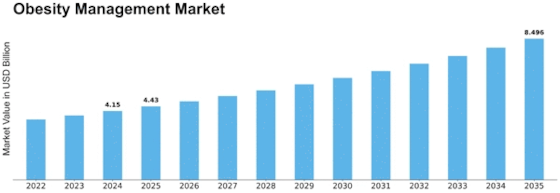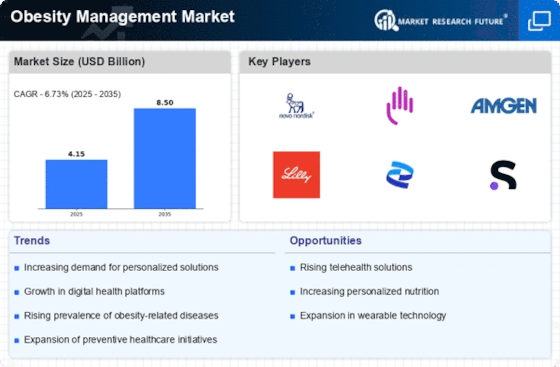Surgical Procedures
Pharmacotherapy
Lifestyle Changes
Fitness Programs
Clinics
Hospitals
Home Care
Fitness Centers
Bariatric Surgery
Pharmaceuticals
Nutritional Counseling
Behavioral Therapy
Online Pharmacies
Retail Pharmacies
Hospitals
Direct Sales
North America
Europe
South America
Asia Pacific
Middle East and Africa
North America Outlook (USD Billion, 2019-2035)
Obesity Management Market by Type
Surgical Procedures
Pharmacotherapy
Lifestyle Changes
Fitness Programs
Obesity Management Market by End User Type
Clinics
Hospitals
Home Care
Fitness Centers
Obesity Management Market by Treatment Method Type
Bariatric Surgery
Pharmaceuticals
Nutritional Counseling
Behavioral Therapy
Obesity Management Market by Distribution Channel Type
Online Pharmacies
Retail Pharmacies
Hospitals
Direct Sales
Obesity Management Market by Regional Type
US
Canada
US Outlook (USD Billion, 2019-2035)
Obesity Management Market by Type
Surgical Procedures
Pharmacotherapy
Lifestyle Changes
Fitness Programs
Obesity Management Market by End User Type
Clinics
Hospitals
Home Care
Fitness Centers
Obesity Management Market by Treatment Method Type
Bariatric Surgery
Pharmaceuticals
Nutritional Counseling
Behavioral Therapy
Obesity Management Market by Distribution Channel Type
Online Pharmacies
Retail Pharmacies
Hospitals
Direct Sales
CANADA Outlook (USD Billion, 2019-2035)
Obesity Management Market by Type
Surgical Procedures
Pharmacotherapy
Lifestyle Changes
Fitness Programs
Obesity Management Market by End User Type
Clinics
Hospitals
Home Care
Fitness Centers
Obesity Management Market by Treatment Method Type
Bariatric Surgery
Pharmaceuticals
Nutritional Counseling
Behavioral Therapy
Obesity Management Market by Distribution Channel Type
Online Pharmacies
Retail Pharmacies
Hospitals
Direct Sales
Europe Outlook (USD Billion, 2019-2035)
Obesity Management Market by Type
Surgical Procedures
Pharmacotherapy
Lifestyle Changes
Fitness Programs
Obesity Management Market by End User Type
Clinics
Hospitals
Home Care
Fitness Centers
Obesity Management Market by Treatment Method Type
Bariatric Surgery
Pharmaceuticals
Nutritional Counseling
Behavioral Therapy
Obesity Management Market by Distribution Channel Type
Online Pharmacies
Retail Pharmacies
Hospitals
Direct Sales
Obesity Management Market by Regional Type
Germany
UK
France
Russia
Italy
Spain
Rest of Europe
GERMANY Outlook (USD Billion, 2019-2035)
Obesity Management Market by Type
Surgical Procedures
Pharmacotherapy
Lifestyle Changes
Fitness Programs
Obesity Management Market by End User Type
Clinics
Hospitals
Home Care
Fitness Centers
Obesity Management Market by Treatment Method Type
Bariatric Surgery
Pharmaceuticals
Nutritional Counseling
Behavioral Therapy
Obesity Management Market by Distribution Channel Type
Online Pharmacies
Retail Pharmacies
Hospitals
Direct Sales
UK Outlook (USD Billion, 2019-2035)
Obesity Management Market by Type
Surgical Procedures
Pharmacotherapy
Lifestyle Changes
Fitness Programs
Obesity Management Market by End User Type
Clinics
Hospitals
Home Care
Fitness Centers
Obesity Management Market by Treatment Method Type
Bariatric Surgery
Pharmaceuticals
Nutritional Counseling
Behavioral Therapy
Obesity Management Market by Distribution Channel Type
Online Pharmacies
Retail Pharmacies
Hospitals
Direct Sales
FRANCE Outlook (USD Billion, 2019-2035)
Obesity Management Market by Type
Surgical Procedures
Pharmacotherapy
Lifestyle Changes
Fitness Programs
Obesity Management Market by End User Type
Clinics
Hospitals
Home Care
Fitness Centers
Obesity Management Market by Treatment Method Type
Bariatric Surgery
Pharmaceuticals
Nutritional Counseling
Behavioral Therapy
Obesity Management Market by Distribution Channel Type
Online Pharmacies
Retail Pharmacies
Hospitals
Direct Sales
RUSSIA Outlook (USD Billion, 2019-2035)
Obesity Management Market by Type
Surgical Procedures
Pharmacotherapy
Lifestyle Changes
Fitness Programs
Obesity Management Market by End User Type
Clinics
Hospitals
Home Care
Fitness Centers
Obesity Management Market by Treatment Method Type
Bariatric Surgery
Pharmaceuticals
Nutritional Counseling
Behavioral Therapy
Obesity Management Market by Distribution Channel Type
Online Pharmacies
Retail Pharmacies
Hospitals
Direct Sales
ITALY Outlook (USD Billion, 2019-2035)
Obesity Management Market by Type
Surgical Procedures
Pharmacotherapy
Lifestyle Changes
Fitness Programs
Obesity Management Market by End User Type
Clinics
Hospitals
Home Care
Fitness Centers
Obesity Management Market by Treatment Method Type
Bariatric Surgery
Pharmaceuticals
Nutritional Counseling
Behavioral Therapy
Obesity Management Market by Distribution Channel Type
Online Pharmacies
Retail Pharmacies
Hospitals
Direct Sales
SPAIN Outlook (USD Billion, 2019-2035)
Obesity Management Market by Type
Surgical Procedures
Pharmacotherapy
Lifestyle Changes
Fitness Programs
Obesity Management Market by End User Type
Clinics
Hospitals
Home Care
Fitness Centers
Obesity Management Market by Treatment Method Type
Bariatric Surgery
Pharmaceuticals
Nutritional Counseling
Behavioral Therapy
Obesity Management Market by Distribution Channel Type
Online Pharmacies
Retail Pharmacies
Hospitals
Direct Sales
REST OF EUROPE Outlook (USD Billion, 2019-2035)
Obesity Management Market by Type
Surgical Procedures
Pharmacotherapy
Lifestyle Changes
Fitness Programs
Obesity Management Market by End User Type
Clinics
Hospitals
Home Care
Fitness Centers
Obesity Management Market by Treatment Method Type
Bariatric Surgery
Pharmaceuticals
Nutritional Counseling
Behavioral Therapy
Obesity Management Market by Distribution Channel Type
Online Pharmacies
Retail Pharmacies
Hospitals
Direct Sales
APAC Outlook (USD Billion, 2019-2035)
Obesity Management Market by Type
Surgical Procedures
Pharmacotherapy
Lifestyle Changes
Fitness Programs
Obesity Management Market by End User Type
Clinics
Hospitals
Home Care
Fitness Centers
Obesity Management Market by Treatment Method Type
Bariatric Surgery
Pharmaceuticals
Nutritional Counseling
Behavioral Therapy
Obesity Management Market by Distribution Channel Type
Online Pharmacies
Retail Pharmacies
Hospitals
Direct Sales
Obesity Management Market by Regional Type
China
India
Japan
South Korea
Malaysia
Thailand
Indonesia
Rest of APAC
CHINA Outlook (USD Billion, 2019-2035)
Obesity Management Market by Type
Surgical Procedures
Pharmacotherapy
Lifestyle Changes
Fitness Programs
Obesity Management Market by End User Type
Clinics
Hospitals
Home Care
Fitness Centers
Obesity Management Market by Treatment Method Type
Bariatric Surgery
Pharmaceuticals
Nutritional Counseling
Behavioral Therapy
Obesity Management Market by Distribution Channel Type
Online Pharmacies
Retail Pharmacies
Hospitals
Direct Sales
INDIA Outlook (USD Billion, 2019-2035)
Obesity Management Market by Type
Surgical Procedures
Pharmacotherapy
Lifestyle Changes
Fitness Programs
Obesity Management Market by End User Type
Clinics
Hospitals
Home Care
Fitness Centers
Obesity Management Market by Treatment Method Type
Bariatric Surgery
Pharmaceuticals
Nutritional Counseling
Behavioral Therapy
Obesity Management Market by Distribution Channel Type
Online Pharmacies
Retail Pharmacies
Hospitals
Direct Sales
JAPAN Outlook (USD Billion, 2019-2035)
Obesity Management Market by Type
Surgical Procedures
Pharmacotherapy
Lifestyle Changes
Fitness Programs
Obesity Management Market by End User Type
Clinics
Hospitals
Home Care
Fitness Centers
Obesity Management Market by Treatment Method Type
Bariatric Surgery
Pharmaceuticals
Nutritional Counseling
Behavioral Therapy
Obesity Management Market by Distribution Channel Type
Online Pharmacies
Retail Pharmacies
Hospitals
Direct Sales
SOUTH KOREA Outlook (USD Billion, 2019-2035)
Obesity Management Market by Type
Surgical Procedures
Pharmacotherapy
Lifestyle Changes
Fitness Programs
Obesity Management Market by End User Type
Clinics
Hospitals
Home Care
Fitness Centers
Obesity Management Market by Treatment Method Type
Bariatric Surgery
Pharmaceuticals
Nutritional Counseling
Behavioral Therapy
Obesity Management Market by Distribution Channel Type
Online Pharmacies
Retail Pharmacies
Hospitals
Direct Sales
MALAYSIA Outlook (USD Billion, 2019-2035)
Obesity Management Market by Type
Surgical Procedures
Pharmacotherapy
Lifestyle Changes
Fitness Programs
Obesity Management Market by End User Type
Clinics
Hospitals
Home Care
Fitness Centers
Obesity Management Market by Treatment Method Type
Bariatric Surgery
Pharmaceuticals
Nutritional Counseling
Behavioral Therapy
Obesity Management Market by Distribution Channel Type
Online Pharmacies
Retail Pharmacies
Hospitals
Direct Sales
THAILAND Outlook (USD Billion, 2019-2035)
Obesity Management Market by Type
Surgical Procedures
Pharmacotherapy
Lifestyle Changes
Fitness Programs
Obesity Management Market by End User Type
Clinics
Hospitals
Home Care
Fitness Centers
Obesity Management Market by Treatment Method Type
Bariatric Surgery
Pharmaceuticals
Nutritional Counseling
Behavioral Therapy
Obesity Management Market by Distribution Channel Type
Online Pharmacies
Retail Pharmacies
Hospitals
Direct Sales
INDONESIA Outlook (USD Billion, 2019-2035)
Obesity Management Market by Type
Surgical Procedures
Pharmacotherapy
Lifestyle Changes
Fitness Programs
Obesity Management Market by End User Type
Clinics
Hospitals
Home Care
Fitness Centers
Obesity Management Market by Treatment Method Type
Bariatric Surgery
Pharmaceuticals
Nutritional Counseling
Behavioral Therapy
Obesity Management Market by Distribution Channel Type
Online Pharmacies
Retail Pharmacies
Hospitals
Direct Sales
REST OF APAC Outlook (USD Billion, 2019-2035)
Obesity Management Market by Type
Surgical Procedures
Pharmacotherapy
Lifestyle Changes
Fitness Programs
Obesity Management Market by End User Type
Clinics
Hospitals
Home Care
Fitness Centers
Obesity Management Market by Treatment Method Type
Bariatric Surgery
Pharmaceuticals
Nutritional Counseling
Behavioral Therapy
Obesity Management Market by Distribution Channel Type
Online Pharmacies
Retail Pharmacies
Hospitals
Direct Sales
South America Outlook (USD Billion, 2019-2035)
Obesity Management Market by Type
Surgical Procedures
Pharmacotherapy
Lifestyle Changes
Fitness Programs
Obesity Management Market by End User Type
Clinics
Hospitals
Home Care
Fitness Centers
Obesity Management Market by Treatment Method Type
Bariatric Surgery
Pharmaceuticals
Nutritional Counseling
Behavioral Therapy
Obesity Management Market by Distribution Channel Type
Online Pharmacies
Retail Pharmacies
Hospitals
Direct Sales
Obesity Management Market by Regional Type
Brazil
Mexico
Argentina
Rest of South America
BRAZIL Outlook (USD Billion, 2019-2035)
Obesity Management Market by Type
Surgical Procedures
Pharmacotherapy
Lifestyle Changes
Fitness Programs
Obesity Management Market by End User Type
Clinics
Hospitals
Home Care
Fitness Centers
Obesity Management Market by Treatment Method Type
Bariatric Surgery
Pharmaceuticals
Nutritional Counseling
Behavioral Therapy
Obesity Management Market by Distribution Channel Type
Online Pharmacies
Retail Pharmacies
Hospitals
Direct Sales
MEXICO Outlook (USD Billion, 2019-2035)
Obesity Management Market by Type
Surgical Procedures
Pharmacotherapy
Lifestyle Changes
Fitness Programs
Obesity Management Market by End User Type
Clinics
Hospitals
Home Care
Fitness Centers
Obesity Management Market by Treatment Method Type
Bariatric Surgery
Pharmaceuticals
Nutritional Counseling
Behavioral Therapy
Obesity Management Market by Distribution Channel Type
Online Pharmacies
Retail Pharmacies
Hospitals
Direct Sales
ARGENTINA Outlook (USD Billion, 2019-2035)
Obesity Management Market by Type
Surgical Procedures
Pharmacotherapy
Lifestyle Changes
Fitness Programs
Obesity Management Market by End User Type
Clinics
Hospitals
Home Care
Fitness Centers
Obesity Management Market by Treatment Method Type
Bariatric Surgery
Pharmaceuticals
Nutritional Counseling
Behavioral Therapy
Obesity Management Market by Distribution Channel Type
Online Pharmacies
Retail Pharmacies
Hospitals
Direct Sales
REST OF SOUTH AMERICA Outlook (USD Billion, 2019-2035)
Obesity Management Market by Type
Surgical Procedures
Pharmacotherapy
Lifestyle Changes
Fitness Programs
Obesity Management Market by End User Type
Clinics
Hospitals
Home Care
Fitness Centers
Obesity Management Market by Treatment Method Type
Bariatric Surgery
Pharmaceuticals
Nutritional Counseling
Behavioral Therapy
Obesity Management Market by Distribution Channel Type
Online Pharmacies
Retail Pharmacies
Hospitals
Direct Sales
MEA Outlook (USD Billion, 2019-2035)
Obesity Management Market by Type
Surgical Procedures
Pharmacotherapy
Lifestyle Changes
Fitness Programs
Obesity Management Market by End User Type
Clinics
Hospitals
Home Care
Fitness Centers
Obesity Management Market by Treatment Method Type
Bariatric Surgery
Pharmaceuticals
Nutritional Counseling
Behavioral Therapy
Obesity Management Market by Distribution Channel Type
Online Pharmacies
Retail Pharmacies
Hospitals
Direct Sales
Obesity Management Market by Regional Type
GCC Countries
South Africa
Rest of MEA
GCC COUNTRIES Outlook (USD Billion, 2019-2035)
Obesity Management Market by Type
Surgical Procedures
Pharmacotherapy
Lifestyle Changes
Fitness Programs
Obesity Management Market by End User Type
Clinics
Hospitals
Home Care
Fitness Centers
Obesity Management Market by Treatment Method Type
Bariatric Surgery
Pharmaceuticals
Nutritional Counseling
Behavioral Therapy
Obesity Management Market by Distribution Channel Type
Online Pharmacies
Retail Pharmacies
Hospitals
Direct Sales
SOUTH AFRICA Outlook (USD Billion, 2019-2035)
Obesity Management Market by Type
Surgical Procedures
Pharmacotherapy
Lifestyle Changes
Fitness Programs
Obesity Management Market by End User Type
Clinics
Hospitals
Home Care
Fitness Centers
Obesity Management Market by Treatment Method Type
Bariatric Surgery
Pharmaceuticals
Nutritional Counseling
Behavioral Therapy
Obesity Management Market by Distribution Channel Type
Online Pharmacies
Retail Pharmacies
Hospitals
Direct Sales
REST OF MEA Outlook (USD Billion, 2019-2035)
Obesity Management Market by Type
Surgical Procedures
Pharmacotherapy
Lifestyle Changes
Fitness Programs
Obesity Management Market by End User Type
Clinics
Hospitals
Home Care
Fitness Centers
Obesity Management Market by Treatment Method Type
Bariatric Surgery
Pharmaceuticals
Nutritional Counseling
Behavioral Therapy
Obesity Management Market by Distribution Channel Type
Online Pharmacies
Retail Pharmacies
Hospitals
Direct Sales




















Leave a Comment